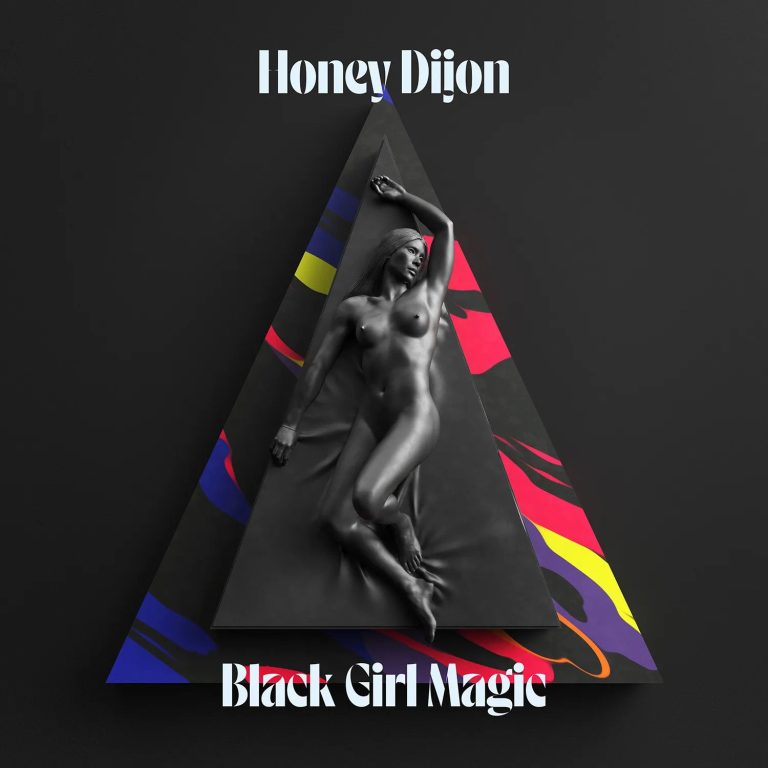Dance music has always had to fight an uphill battle to be respected. Since as far back as the Disco Demolition Night, we’ve seen audiences be against dance music and question its authenticity, substance and value. It is perhaps that ability of dance music to outrage by being happy and beautiful that makes it connect so much with black and queer audiences, whose historical tribulations made every act of celebration an act of defiance. It is that spirit that Honey Dijon brings to life in Black Girl Magic, a record that takes the beauty of blackness, queerness and femininity and bears it all with joyful pride.
In a medium that often engages with love through metaphor and subtext, Honey Dijon chooses the opposite. Spoken intro “Love Is” sees Kameelah Waheed passionately musing about love in all its forms over a scenery of sound that perfectly mirrors the outside of a club. It is a bewitching and quite capturing invitation to the party. Opening song “Love Is A State Of Mind” expands on the intro’s themes, the outdoorsy backdrop replaced with pulsating beats, synths and piano flourishes, and Waheed’s poetry replaced with Ramona Renea’s soaring vocals, which blend into the mix as if they’re another instrument in Dijon’s talented hands.
Dijon explores a blend of human emotionality and dancefloor energy in every way in which way the mixture can be expressed. There is sassiness aplenty, presented with pure class. Kiss-off anthem “It’s Quiet Now” handles a breakup by means of self-love, which, paired with its classy, tightly controlled house sound, feels like vanity in the best way possible. Ballroom anthem in the making “Drama” wards off the negative energy that may follow one to the dancefloor by firmly placing itself above it all. Party starter “Downtown” is another example of dancefloor joy, each note sung and played transmitting the love this record is meant to convey.
Having decades of experience playing parties to every kind of audience, Dijon knows well how to build and release energy in a setlist. Translating that sensibility to record, the album’s middle part contains its most detailed and glamorous run. The production in “Stand” is a lovely nod to Dijon’s work in fashion shows, with a rhythm that perfectly evokes the runway under Cor.Ece’s beautifully layered vocals. “Everybody” pays tribute to Brazil’s emerging queer music scene by inviting friends and frequent collaborators Pabllo Vittar and Urias, the former delivering one of the most lively and energetic vocal performances of his career. At the same time, the latter gives his all to playing the ring leader. “Not About You” is an empowering moment of commanding femininity with one of the album’s best hooks. But the centerpiece of it all is “In The Club”. Though all collaborators have chemistry with Dijon, Eve outdoes all of them. It may not be more than a party song, but it is a perfectly constructed one, with hooks upon hooks and the most replay value to be found in the record.
Finished with this polished core, Dijon spends the rest of the record unraveling with looser, more creative tracks. Between the three voices present, the piano riffs, and the Daft Punk reminiscent synth hooks, “Show Me Love” is an impressively successful experiment in ballroom music. “Don’t Be Afraid” is a fiery, bare-bones techno track that is bound to yield great remixes and live performances. “Work”, by contrast, is jam-packed with instruments, effects and collaborators, in the album’s most free, swirling moment. “C’s Up” and “La Femme Fantastique” are commanding, energetic sound mixtures that focus entirely on Dijon’s producer chops, as she takes back the stage after a party record that very skillfully made the most of its many guests.
Finishing it all in an unexpected move, Dijon takes it easy in the rather low-key closer “Love Me Like You Care”, a charming plea of sentimentality with an instrumental full of fun and funk, perfectly closing off the album’s sonic and lyrical themes.
Having spent much of her career collaborating, remixing, performing live and releasing singles, Honey Dijon never quite branded herself as an albums artist. In spite of that, Black Girl Magic proves how well her abilities translate into whole records, how capable of creating cohesion and maintaining energy she is. Even this far into her career, Dijon leaves one amazed with everything she still could do, be it by going in a more pop direction or by leaning into her experimental side. In the end Black Girl Magic accomplishes two very important goals of any record: reminding you Honey Dijon is an artist to watch, and being quite a fun listen.

